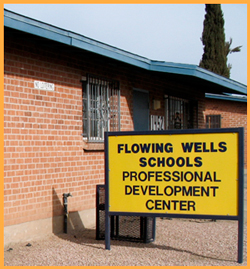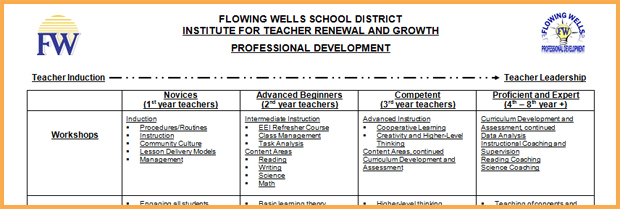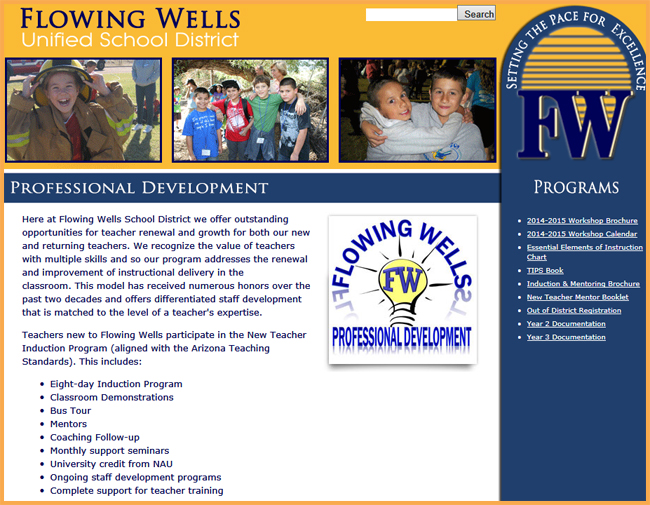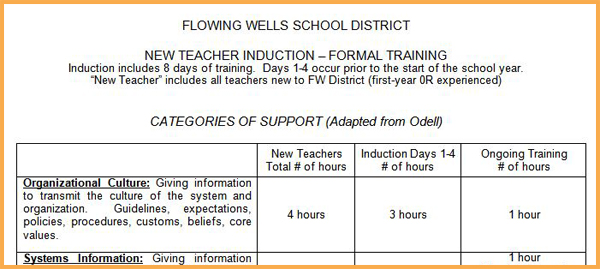 The Flowing Wells Unified School District has a dedicated professional development center with a small, fulltime professional development staff.
The Flowing Wells Unified School District has a dedicated professional development center with a small, fulltime professional development staff. |
Effective Teaching...
by Harry and Rosemary Wong |
To print: Select File and then Print from your browser's menu ------------------------------------------------------------------ This article was printed from Teachers.Net Gazette, located at https://teachers.net. ------------------------------------------------------------------ |
Training Teachers to Be Effective
The Best at What They Do
They are the Flowing Wells Unified School District in Tucson, Arizona. |
 The Flowing Wells Unified School District has a dedicated professional development center with a small, fulltime professional development staff.
The Flowing Wells Unified School District has a dedicated professional development center with a small, fulltime professional development staff.
More importantly, they have had a structured professional development program for over 30 years and have developed a winning culture—and because they have figured out how to bottle that, replicate that, amazing things have happened.
We’re going to open that bottle and show you what’s inside and how you can use it.
Achievement Higher Than Peer Districts
The Flowing Wells professional development program is the basic ingredient in their bottle of success. Through the years, these are the results they have produced:
A 2012 State of Arizona Office of the Auditor General Report stated:
“Student achievement in the Flowing Wells district
was significantly higher than peer districts.”
According to district officials, it was able to achieve these passing rates in large part because “of its extensive teacher-training programs.”
The Extensive Training Program
Induction is the cornerstone of the district’s teacher training program. It is a total process of preparing, supporting, and retaining new teachers. The induction process is designed to train and acculturate new teachers and teachers new to the district to the academic standards, vision, and culture of the district.
The Flowing Wells process of producing an effective teacher begins with a new teacher induction program. The induction process is comprehensive, coherent, and sustained.
The goal of an induction program is to produce teachers who can
Induction Focuses on the District’s Vision
Our introduction to the concept of induction began when we visited the Flowing Wells Unified School District in Tucson, Arizona, in the early 80s. Today, Flowing Wells is a small urban district of over 5,700 students with high poverty (71% free and reduced lunches on average) in a state which has been recently ranked as 48th in school funding.
In recent years, Flowing Wells was required to reduce their budget by 20%. Despite cuts to their general funding and federal professional development grants, the district still highly prioritizes a robust professional development offering, as well as coaching and mentoring for teachers within their first three years. Kudos to the district’s leadership for fighting to develop and keep effective teachers and not let them slip away!
The district’s professional development program takes a teacher through five incremental stages, from novice, advanced beginner, competent, proficient to expert, which then seamlessly flows into a life-long professional development program called the Institute for Teacher Renewal and Growth. Their program is structured to produce effective teachers. Their mission is unmistakable—to produce effective teachers who can teach.

Click here to read the rest of the details of their multi-year professional growth plan.
The Flowing Wells induction program emphasizes five critical attributes that are the cornerstones of the district’s vision:
The district’s website shows the thoroughness of the induction program for developing highly effective teachers.

These are the outcomes the Flowing Wells induction program has been able to achieve:
Formalized Training Chart
Teachers want training; they want to fit in; they want to do their best; and they want their students to achieve. For the most part, education has failed to recognize what other industries have recognized almost from the start—formalized, sustained training matters.
Flowing Wells has a formalized professional new teacher induction program that is comprehensive in its offerings for teacher development, coherent in that it is not a hodgepodge of the latest fads and programs floating around academic circles, and sustained in its efforts to create expert teachers and to keep them in the district.

Click here to read the rest of the details of the Induction Formal Training Chart.
The Answer Is Effective Instructional Practices
Students learn from how well teachers teach. Students do not learn from programs, technology, or ideologies. Thus, the emphasis of the Flowing Wells professional learning program is on instruction.
Students learn from the instruction that is provided.
The first three days of induction is devoted to effective instructional practices. This is logical because of the overwhelming research on the topic.
It is the teachers and their instructional practices—
not curriculum programs or a change in the school structure—
that improves student learning.
Richard Elmore of Harvard University says, “To improve student learning, you do not change the structure (i.e., block scheduling, smaller class size, small school size, etc.), you change the instructional practices of the teachers. The schools that do best are those that have a clear idea of what kind of instructional practice they want to produce and who then design a training structure to go with it.”
The only way to improve student learning is to improve teacher instructional practice. Good instruction is 15 to 20 times more powerful than family background, income, race, gender, and other explanatory variables.
~Theodore Hershberg
The fourth day of the induction week is focused on classroom management. The new teachers are not even taught about classroom management. They are asked to read the chapters in The First Days of School on procedures, and then they are taken to visit demonstration classrooms to observe how master teachers teach procedures on their first day.
This is coordinated in advance by hiring four or five master teachers (in various grade levels and content areas) to get their rooms ready early and to host a group of new teachers for approximately two hours.
The master teachers demonstrate their simulated first day of school, with the new teachers as their “students.” The master teachers then debrief the simulation with the new teachers (these could be veteran teachers who are new to Flowing Wells), helping them to analyze the many procedures and management strategies that were woven into the simulation. This is especially powerful because it also helps the new teachers see how to plan and teach procedures rather than simply tell procedures to their students.
The master teachers provide the new teachers with print or electronic copies of everything demonstrated during the simulation.
When the new teachers return to the district training facility, they are further debriefed of the entire experience, and then they set their organizational procedures for their own first day of school.
According to Tricia Gutierrez, director of the professional development program, “Through observations of master teachers in action, the reading of assigned chapters from The First Days of School, and cooperative conversation, our new teachers understand procedures without the need for direct instruction.”
What Keeps Effective Teachers
Collaboration is the most effective way for teachers to learn. The era of isolated teaching is over. Teachers learn more in sustained teacher networks and study groups than with individual mentors. Good teaching thrives in a collaborative learning environment created by teachers and school leaders working together to improve learning in strong, professional learning communities.
What keeps effective teachers is a structured, focused, and sustained professional development program that allows new teachers to observe others, to be observed by others, and to be part of networks or study groups where all teachers share together, grow together, and learn to respect each other’s work.
Effective school districts effectively train and nurture all teachers to reach great heights. Every moment of each day is an opportunity for teachers to grow and learn and reach the top of their profession.
Notice the words “effectively trained.” That’s what the Flowing Wells Unifed School District has been doing with its new teachers for over 30 years!
Each year in Arizona, the Cactus League spring training is held for 14 major league baseball teams that bask in the sunshine to train and get ready for the season ahead.
In every aspect of the real world, people are trained. Walmart, Home Depot, and Southwest Airlines train their employees. Even local small businesses—real estate offices, dentists, and grocery stores—train their new workers, and they are trained to work collaboratively. Every business does this, from the day an employee joins the company or team until that person leaves.
Compare this with many schools where training is nonexistent.
In a study of seven urban districts, Cross and Rigden (2002) reported, “The only reform effort that clearly resulted in student achievement gains had clear instructional expectations, supported by extensive professional development, over a period of several years.”
This kind of learning and teaching happens when districts have a comprehensive induction program for their teachers. Yet, many schools and school districts offer no training and support with many assigning an untrained, hard-to-find mentor thinking that is sufficient to create an effective teacher and school. They completely ignore the research that overwhelming states:
Over one million new teachers received mentoring between 1993 through 2003, but we know little about the magnitude of the benefits they have received or how the impact of mentoring varied across different types of programs. Despite the popularity of mentoring, little is known about its impact on employee turnover and skill acquisition.
| Jonah Rockoff. “Does Mentoring Reduce Turnover and Improve Skills of New Employees? Evidence from Teachers in New York City.” NBER Working Paper, February, 2008. |
One-on-one mentoring does not improve student learning.
Click here for more research on the efficacy of mentoring.
Successful Induction Programs
Successful new teacher induction programs are organized the same as baseball training camps and all other new employee training programs found in successful businesses.
It should be self-evident that to simply give a new teacher a mentor will not produce an effective teacher. According to Richard Ingersoll, a good induction program has seven components.
Unfortunately, districts continue to pour millions of dollars into one-on-one mentoring programs. The mentoring program at each school and even between each mentor varies, and there is absolutely no consistency.
Building Human Capacity
Effective school districts use an induction program and a comprehensive professional development program to build human capacity. It is the improved capacity of humans [read: teachers] that teaches students. As the cadre of teachers becomes more and more effective, the students will learn more and more and achieve higher and higher.
The greatest asset of a school district is its teachers. As a school district, Flowing Wells knows to train and teach its teachers to perform at their highest capacity. For more than a quarter of a century, Flowing Wells has been improving the instructional practices of its teachers and creating effective schools. The premise seems logical and simple, but the impact it produces is astounding.
The success of the Flowing Wells induction program speaks volumes to any school district—to any country’s government—training, supporting, and retaining highly qualified teachers is a must. Induction is a must!
If you would like more information about the Flowing Wells Induction and Professional Development Program, contact the Director of the Professional Development Program, at Patricia.Gutierrez@fwusd.org or 520-696-8807.
Programs do not produce student achievement; teachers produce student achievement. Every moment, every day for teachers is an opportunity to grow and excel, and be effective—for children.
Effective teachers—children deserve nothing less.